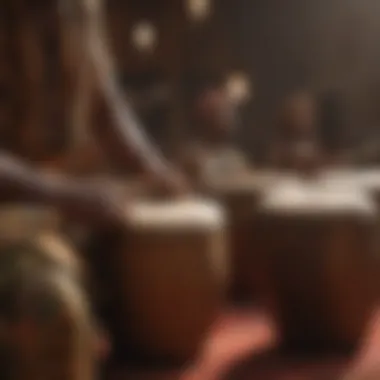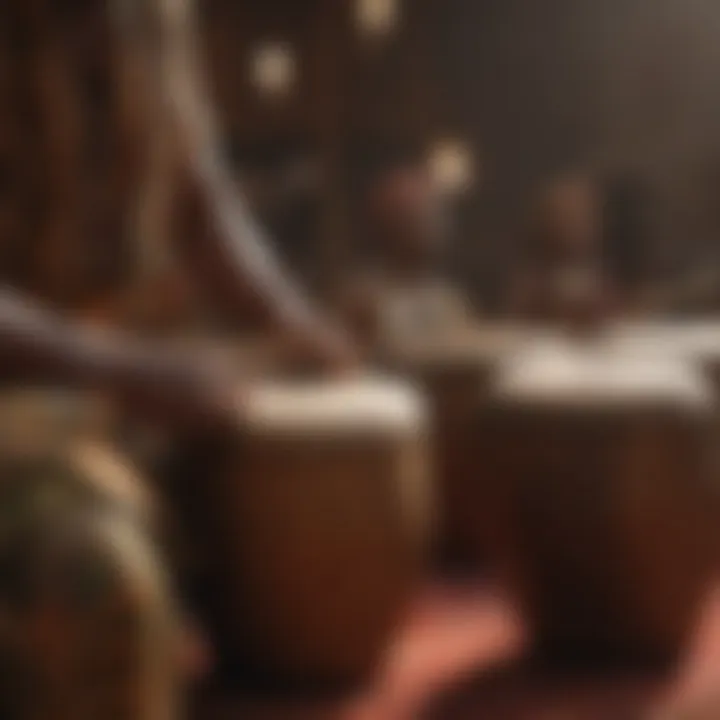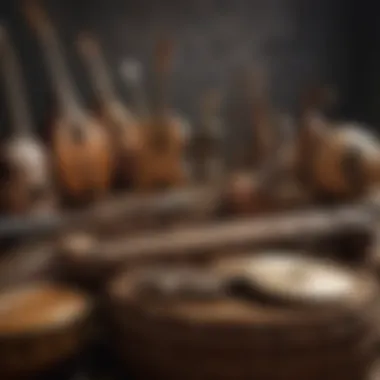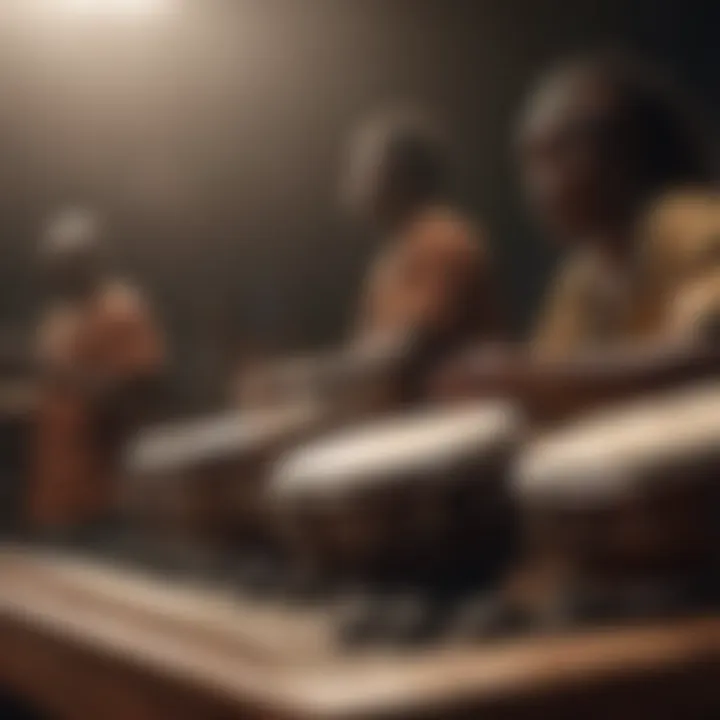Exploring the African Essence in Global Music


Intro
The world of music is a living tapestry, woven with threads that resonate through different cultures and epochs. When you look closely, there is an undeniable pulse that hails from Africa. Its significance goes beyond mere sound; it’s a deep-rooted essence that has shaped countless musical genres globally. From the strumming of a guitar in blues to the intricate drum patterns of hip-hop, African music sensors diverse rhythms and storytelling traditions that echo across continents.
Understanding this essence means exploring its historical roots, cultural meanings, and the artists who breathe life into these sounds today. As we embark on this journey, examining the musical fabric woven with African beats and narratives, the exploration becomes a kaleidoscope of rhythm, language, and emotion.
In this article, we will delve into the artists who embody this essence, dissect songs that reflect these influences, and analyze the profound legacy that African music sows into today’s global soundscape.
Artist Profile
Biography and Background
One figure that stands as a beacon of African essence is Angelique Kidjo, a Beninese singer, songwriter, and activist. Born in Ouidah, Kidjo's music career has spanned over three decades, blending influences from her West African roots with a range of genres including jazz, funk, and reggae. Her early days were steeped in the oral traditions of storytelling and dance, forged within the cultural kaleidoscope of West Africa. Her ability to weave these traditions into her music has brought African sounds to the forefront of the global music conversation.
Major Influences and Inspirations
Kidjo's influences are as diverse as her music.
She draws inspiration from traditional African music, incorporating elements from Benin's Vodoun rhythms, to the flames of Afrobeats and the smoothness of jazz.
Her collaborations with international artists like Alicia Keys and the Talking Heads’ David Byrne have also reflected her commitment to blending cultures. This artistic fusion fosters a rich dialogue between genres, breaking down barriers and transcending geographical limitations. In many ways, Kidjo is a torchbearer, lighting the way for future musicians and showcasing the beauty of mixing influences.
Song Analysis
Theme and Lyrics Breakdown
In her famed song "Agolo," Kidjo encapsulates African spirituality and the reverence for ancestral connection. The lyrics explore themes of environmentalism and the urgency of respecting the planet—a common thread in many African musical narratives. The call to action in her lyrics is heartfelt and compelling, urging listeners to reflect upon their relationship with nature and community.
Instrumentation and Composition
Musically, “Agolo” is rich with a vibrant tapestry of sounds. The arrangement features:
- Traditional instruments like the kora and djembe, which provide a grounding pulse.
- Layered harmonies that showcase her vocal prowess while inviting listeners into a collective experience.
- A mix of upbeat tempos entwined with reflective melodies, creating a balance that mirrors the dualities present in life.
The composition not only highlights African rhythms but also signals its dynamic evolution within the global context.
"African music is not just sound; it’s an identity, a narrative, a groove that continues to dance through the ages." — Angelique Kidjo
This article aims to peel back the layers of African essence in music. Through exploring the life and impact of artists like Angelique Kidjo, we gain a window into understanding how profound this cultural influence is on the music we know today.
Preamble to African Essence in Music
Music, at its core, is a vivid reflection of culture and identity. When we turn our ears towards Africa, we encounter a world rich in sounds that transcend simple melodies. African music dives into the very heart of human experience, bridging gaps between generations, tribes, and countries. It serves not just as entertainment but as a vehicle for storytelling and communal engagement.
A significant aspect of understanding African music lies in appreciating its historical depth. This essence is rooted in the continent’s diverse histories, traditions, and languages. Africa, with its myriad of ethnic groups, has cultivated unique musical styles shaped by the local environment, experiences, and even interpersonal relationships. For music enthusiasts and aspiring musicians, this topic unveils a treasure trove of rhythms, tonalities, and instrumentation.
Why Explore African Essence in Music?
Exploring the African essence in music involves more than scratching the surface; it requires delving into the very fabric of life in various African societies. Some key elements that make this exploration crucial include:
- Understanding Origins: Recognizing the origins of various genres rooted in African traditions can provide insights into contemporary music.
- Cultural Connection: Through its music, Africa offers a palpable connection to its past, engaging listeners in rituals, celebrations, and day-to-day life.
- Universal Language: Music is that universal language. The intricate rhythms and melodies of African music resonate globally and influence international artists across genres.
The themes explored in this article endeavor to showcase not only the distinctive characteristics of African music but also its ability to adapt and evolve. In today's interconnected world, the African musical essence continues to inspire and forge new paths, making it an important area of study for anyone interested in music and culture.
"Without music, life would be a mistake." – Friedrich Nietzsche
The interplay of various musical forms reflects Africa’s rich cultural tapestry, as seen through genres such as Afrobeat, Highlife, and modern Hip Hop. Each genre tells a story, not only of historical significance but also of the present-day dynamism within the African musical landscape. Delving into these themes will help illuminate how African music shapes our global experience, and why its essence is as relevant now as it ever was.
Historical Context
Understanding the historical context of African music is like peeking behind the curtain of a vibrant cultural tapestry. This section delves into the roots and evolution of African music, offering valuable insights into the ways in which it has shaped, and continues to shape, the global soundscape. By grasping the significance of this topic, we can appreciate how the past has influenced current music practices and genres.
Origins of African Music
African music, diverse as the continent itself, traces its origins back to prehistoric times. Archaeological findings have uncovered ancient instruments made from materials like wood, bones, and animal skins, signifying that rhythmic expression has been a means of communication since time immemorial. Different regions contributed their unique flavors: for example, the djembe, originating from West Africa, provides intricate rhythms used in various ceremonies and celebrations.
What's fascinating is that music in Africa is not merely a form of entertainment; it often intertwines with daily life. In many cultures, music is used to celebrate births, weddings, and rites of passage, acting as a communal glue that holds society together. This collective participation in music has been foundational, helping to maintain cultural identity over generations.
The Role of Oral Tradition
Oral tradition has played a pivotal role in the transmission of African music. Before the advent of written language, African societies relied heavily on oral storytelling and performance. This practice allowed for the passing down of histories, morals, and values, making music a crucial element in cultural education.


As songs were composed and adjusted over generations, the original tales evolved, reflecting changing social landscapes. The interplay of music and oral tradition gives rise to what can be described as living histories, which remain embedded within the fabric of African culture. For instance, in the Griot tradition of West Africa, musicians serve not just as entertainers but as historians and genealogists, ensuring that narratives are kept alive through their performances.
"Music is the shorthand of emotion." - Leo Tolstoy
This quote highlights the deep emotional aspect of music, which is especially pronounced in oral traditions where the passion and deliverance can invoke strong feelings and communal connections.
Colonial Influences
The colonial era marked a dramatic shift in the landscape of African music. As European powers imposed their rule, they also sought to control cultural expressions. Many musical practices faced suppression, yet paradoxically, this had a dual effect that led to the emergence of new genres. This time period saw the blending of African rhythms with European musical elements, giving birth to unique hybrid forms.
For example, in the Caribbean, African slaves fused their musical traditions with European styles, resulting in genres like calypso and reggae. This synthesis not only enriched the musical fabric but also created a dialogue between cultures. While colonialism posed challenges, it inadvertently catalyzed the global spread of African music, allowing its essence to permeate other musical styles around the world.
The complex interplay of resistance and adaptation during colonial times sets the stage for understanding contemporary African music. By acknowledging these historical nuances, we see how deeply rooted African music is in a continuum of struggles, joys, and innovations.
Core Elements of African Music
The essence of African music does not simply rest on the surface; it is woven into a rich tapestry of rhythms, melodies, and instruments. This section will delve into what makes the core elements of African music so distinct and significant. Here, we will explore rhythm and percussion, melody and harmony, and the variations in instrumentation. Each piece is integral, not just to the music itself but to the cultural identity of numerous African communities.
The core elements serve as a mirror reflecting the diverse cultural landscapes across the continent. Understanding these elements is not just for music enthusiasts; they are also key considerations for aspiring musicians. By learning distillation of culture through sound, one can appreciate the depth and vibrancy that African music brings to the global stage.
Rhythm and Percussion
Rhythm is the backbone of African music. It is often described as the lifeblood that infuses spirit into sound. Percussion instruments, such as the djembe, talking drums, and ashiko, are prevalent and play a pivotal role in establishing complex rhythmic structures. These instruments provide a platform for storytelling, as rhythms convey emotions and meanings beyond words.
African rhythms can be intricate and layered. Unlike the regular beat found in many Western musical forms, African drum patterns may include polyrhythmic elements—different rhythms played simultaneously. For instance, in a township of South Africa, it's common to hear the deep rumble of a djembe alongside the sharp clicks of a sodina, creating a lively, interlocking effect that can get a crowd moving.
Moreover, rhythm extends beyond just beat; it sets the pace for dance and social interaction. In many cultures, gatherings revolve around musical festivals where community bonds strengthen through coordinated movements and shared experiences, often spurred by rhythmic elements.
Melody and Harmony
Transitioning to melody and harmony, African music often embraces a unique approach. Melodies tend to be simple yet captivating, frequently constructed using a limited set of notes. This approach allows for repeated phrases that become earworms, sticking with the listener long after the first encounter.
Harmonically, many traditional African songs employ a call-and-response technique. This structure not only invites participation but also fosters a communal experience. Imagine being in a village where the lead singer calls out a phrase, and the rest of the community responds in delight. This communal singing strengthens ties and emphasizes shared cultural narratives.
Melody, while vital, is often secondary to rhythm. In many cases, the rhythmic patterns guide the melody rather than the other way around. This contrasts sharply with Western music, which typically prioritizes harmonic accompaniment.
Instrumentation Variations
Instrumentation is as diverse as the cultures it represents. From string instruments like the kora to wind instruments such as the mbira, the choices in instruments reflect the specific customs and traditions of various regions. For instance, West African music may incorporate the balafon, a wooden percussion instrument akin to a xylophone, known for its rich, resonant tones.
Different regions also show variation in how instruments are played. In East Africa, the nyatiti, an eight-stringed lyre, is commonly associated with lyrical storytelling. Special techniques are used to create melodies that resonate with the audience on deeper emotional levels.
The melding of instruments creates a sonic collage that can range from the vibrant and cacophonous to the soft and soothing, catering to various occasions and emotions. Notably, the use of unconventional materials in instrument crafting can lead to unique sounds; for instance, hollowed-out trees or animal skins can produce distinctive tones unheard in Western music.
"In African music, every sound, every rhythm tells a story, creating a unique voice that resonates across time and culture."
In wrapping up this section, it becomes clear that the core elements of African music are not just technical aspects of music theory. They embody rich traditions that speak to identity, community, and culture. Each element, from rhythm to instrumentation, plays an indispensable role in shaping the soundscapes that define African music and its influence across global genres.
Cultural Significance
The cultural significance of African music stretches across both time and geography, weaving its threads through the fabric of communities. Music is not simply a form of entertainment; it's a medium for conveying values, beliefs, and histories that define peoples and their experiences. This section illuminates the multifaceted roles that music plays in society, from fostering social cohesion to enriching spiritual rituals.
Music as a Communal Activity
In many African cultures, music is deeply embedded in communal life. It's a tool for unity, bridging generations and different age groups. When a community gathers to celebrate, mourn, or share stories, music forms the backdrop of these significant events. Instruments, whether it be drums from the Djembe or the Kora, resonate purpose and identity. Communication happens not just through words but through rhythm, melody, and dance, allowing participants to express emotions in profound yet instinctual ways.
For example, during harvest celebrations, groups might sing songs that recount their daily labor, sharing a history that nurtures both pride and resilience. This form of collective expression strengthens bonds and reaffirms communal identity, reminding individuals they are part of something greater.
"In a gathering, the rhythm of the drum can be felt as a heartbeat, pulsing life into the community, signifying both joy and pain."
- Anonymous
The Role of Music in Rituals
Rituals often incorporate music as a sacred element, serving as a conduit for the divine. During rites of passage—such as births, initiations, and funerals—sounds play a critical role in enhancing the emotional significance of the event. These rituals mark transitions not just for individuals, but for entire communities.
Take, for instance, the libation ceremony, where music creates an atmosphere allowing ancestors to be honored and invoked. The rhythmic chanting, often accompanied by drumming, transforms the experience into a spiritual journey. Here, music is not just an accompaniment; it's the very essence of rituals that connects the physical with the spiritual realm.
Music and Identity


In an ever-globalizing world, music remains a powerful statement of identity. For many individuals, particularly in African communities, the melodies and lyrics encapsulate cultural heritage and pride. The use of indigenous languages in songs fosters a sense of belonging and familiarity, reinforcing ties to lineage and history.
Moreover, artists often draw from their roots to express contemporary issues, merging tradition with modernity. This evolution not only reflects personal identity but serves as a critique of societal norms, giving voice to the struggles and aspirations of their people.
In summary, the cultural significance of African music transcends mere aesthetics. It embodies the essence of communal life, anchors rituals in deeper meaning, and serves as a powerful vehicle for personal and collective identity. As we continue to explore the intricate tapestry of African music, we find that its essence is woven into the very soul of humanity.
Genres Influenced by African Essence
The impact of African music on global genres is deep and far-reaching. The rhythms, melodies, and cultural expressions rooted in Africa have forged new paths in music and continue to breathe life into genres across the world. As we dive into this section, the aim is to illuminate the distinctive elements that African influence brings to various music styles. This influence is not just a passing trend; it shapes musical identities and icons globally. It deserves special attention, for its relevance transcends geographical boundaries, fostering creativity and conversation among diverse audiences.
Afrobeat and its Pioneers
Born in the bustling streets of Nigeria in the late 1960s, Afrobeat blends traditional African music with jazz, funk, and highlife to create a sound that is both revolutionary and captivating. Pioneered by the legendary Fela Kuti, this genre is celebrated for its infectious grooves and politically charged lyrics, offering social commentary on corruption and oppression. Fela's ensemble, the Africa 70 band, was instrumental in this movement, transforming performances into vibrant and rhythmic spectacles that drew crowds from near and far. Tracks like "Water No Get Enemy" stand as testaments to Afrobeat's intricate styles, often featuring extended instrumental sections packed with dynamic percussion and brass. The genre was not only a source of entertainment; it became an avenue for social activism, making it an essential element in understanding the narratives of the African experience.
Highlife Music Phenomenon
Highlife music, with its origins traced back to Ghana, is a celebration of the fusion between traditional African rhythms and Western musical elements. It evolved in the early 20th century, initially catering to the elites but gradually reaching the masses. Artists like E.T. Mensah earned the title "King of Highlife" for his ability to blend catchy melodies with local dance rhythms. The use of brass instruments, guitars, and traditional drums created a sound that encourages joyous expression. Highlife embodies the essence of communal gatherings, where people come together to dance and celebrate life. The waves of Highlife can be felt from Accra to Lagos and beyond, influencing subsequent genres like reggae and pop.
The Birth of Reggae
Reggae, a genre that originated in Jamaica in the late 1960s, carries the unmistakable imprint of African musical traditions. Its syncopated rhythm, smooth bass lines, and socially conscious lyrics owe much to the African diaspora's musical roots. Artists such as Bob Marley and Peter Tosh popularized reggae, lending voices to struggles for justice and equality. The incorporation of Rastafarian themes into their music further deepened this cultural connection. In many ways, reggae serves as a bridge; it showcases how African music intertwined with Caribbean influences can resonate worldwide, addressing universal themes of love, pain, and resistance.
Contemporary Genres: Hip Hop and R&B
In recent years, Hip Hop and R&B have emerged as dominant genres, and they too draw heavily from African musical essence. The rhythm and poetry of Hip Hop echo the call-and-response patterns found in many African traditions. Artists like Kendrick Lamar and Burna Boy represent a new wave where African sounds infiltrate mainstream music, creating a hybrid that resonates deeply with audiences. R&B too has embraced this evolution; artists like H.E.R. and Alicia Keys often incorporate African rhythms into their melodies, showcasing a beautiful marriage of contemporary and traditional music.
Global collaborations, such as those seen in the works of Drake with Afrobeat producers, underscore this cross-pollination of genres, revealing how African essence actively shapes the future of music both locally and internationally.
“Music is the language of the spirit. It opens the secret of life bringing peace, abolishing strife.” – Khalil Gibran
As we explore these genres influenced by African music, it’s clear that they are more than just sounds or styles. They represent a complex tapestry of history, culture, and resilience. Whether through the rhythmic beats of Afrobeat, the harmonic evolution of Highlife, or the lyrical storytelling in reggae and R&B, the essence of African music continues to inspire and transform the global musical landscape.
Influential Artists Representing African Essence
African music has been shaped and defined by numerous influential artists throughout history. This section highlights important musicians whose work has echoed the rich cultural and musical traditions of the continent, allowing the African essence to transcend borders and resonate globally. Through their innovative approaches, these artists have not only preserved traditional styles but also propelled African sounds into contemporary music scenes. This narrative serves to illustrate how these figures are indispensable to our comprehension of the broader influence African music has on global genres.
Fela Kuti and the Afrobeat Movement
Fela Kuti stands as a towering figure in the world of music, often regarded as the father of Afrobeat. His ingenuity captured the essence of African rhythms, fused with jazz, funk, and traditional music forms, creating a sound that was both revolutionary and culturally enriching. Fela used his music as a platform for social and political commentary, tackling issues of corruption, inequality, and human rights in Nigeria through powerful lyrics and infectious grooves.
His ensemble, Africa '70, was not just a band; it became a movement. Each beat reverberated with a call to awareness, urging listeners to engage with societal injustices. The layered rhythms complemented by horns and percussion set the stage for continuous dance, a hallmark of African tradition. Through engaging performances and themes, Fela emphasized music's role not merely as entertainment but also as a vehicle for change.
"Music is the weapon of the future."
— Fela Kuti
Fela Kuti’s legacy continues to influence contemporary artists who borrow from his ingenuity while giving birth to new genres that are steeped in African essence.
Miriam Makeba’s Global Impact
Miriam Makeba, affectionately known as "Mama Africa," brought the sounds and stories of South Africa to the global stage. Through her voice, she conveyed the struggles and hopes of her people, using music to challenge apartheid and advocate for change. Her song "Pata Pata" not only garnered international recognition but also showcased the beauty of African rhythms and dance.
Makeba’s ability to weave traditional music with contemporary themes allowed her to connect diverse audiences, transcending cultural boundaries. Her collaboration with notable musicians like Harry Belafonte stressed her belief in unity through music. Every note she sang was steeped in the fervor of her heritage, embodying the spirit of resistance and resilience prevalent in African communities. By placing African music within a global context, she opened doors and paved the way for future generations of artists.
Burna Boy and the Modern Scene
In the current musical landscape, Burna Boy stands out as a defining voice of African music today. With hits that blend Afro-fusion, reggae, dancehall, and R&B, he captures both contemporary and traditional elements, reflecting on personal and societal narratives. Songs like "Ye" and album African Giant have propelled him onto international platforms, showcasing the global appetite for African sounds.
Burna Boy creatively incorporates elements of African heritage into his music, infusing it with modern sensibilities, thus engaging a broad audience. He also frequently emphasizes the importance of maintaining a connection to his roots while exploring new artistic directions. His collaborations with artists across various genres further illustrate the cross-cultural exchanges taking place today, fostering a deeper appreciation for African heritage.
The Linguistic Dimension of African Music
The connection between language and music in Africa is as deep as the roots of a baobab tree. Language serves not just as a tool for communication but also as a vital vessel for cultural expression. In African music, the linguistic element goes beyond mere words; it embodies rhythm, emotion, and heritage. The songs sung in various languages often encapsulate life experiences, community values, and historical narratives that connect generations. This intertwining is essential in understanding the African musical essence, as it highlights how language shapes the message and feel of the music.
Languages and Song Lyrics
African music showcases a rich tapestry of languages, each reflecting local cultures, beliefs, and stories. From Swahili in East Africa to Zulu in Southern Africa, the variety is staggering. When you delve into the lyrics, you are often met with metaphorical expressions and proverbs that speak to everyday life and communal beliefs. For instance, songs in Yoruba can convey wisdom through stories that touch on love, community, and the challenges faced by society.
The importance of this linguistic diversity cannot be overstated. Several genres prioritize the clarity and poetry of the lyrics, such as Highlife and Afrobeat, where lyrics convey messages about social issues or political events. Here’s a glimpse at the benefits of exploring languages within African music:


- Cultural Connection: Lyrics act as a bridge between diverse African cultures and listeners.
- Historical Context: Many songs recount historical events, helping keep memories alive.
- Educational Tool: Listeners often learn about different cultures and perspectives through music.
In essence, the nuances in the languages employed create a vivid picture of the thoughts and emotions behind the songs.
Storytelling Traditions
At the heart of African music lies a rich tradition of storytelling. Music is not merely a form of entertainment; it's a way of passing down tales and wisdom from one generation to the next. The narratives told through songs resonate with life lessons, moral teachings, and cultural heritage.
Often, these stories are embedded in the music itself, allowing the audience to experience a slice of history or a profound truth while engaging with the rhythm and melody. A prime example is the griot tradition, particularly prevalent in West Africa, where poets and musicians tell historical stories through their performances.
This dimension of storytelling in African music can be characterized by:
- Community Gathering: Music events often serve as opportunities for collective storytelling, bringing people together in shared experience.
- Variability of Themes: Tales can range from heroic deeds and love stories to cautionary tales about life.
- Interactive Audience: Listeners are encouraged to engage, making the storytelling a dynamic and communal experience.
Global Influences and Cross-Cultural Exchanges
The interplay between African music and global influences tells a compelling story about culture, adaptation, and the shared human experience. This section emphasizes how African musical traditions have traveled across borders, morphing and merging with diverse musical styles around the globe. The rhythms of drums and the resonant calls of voices have found a home in various genres, showing that music acts as a universal language, bridging divides and fostering collaboration.
African Music in Western Contexts
African music did not remain confined to the continent; it embarked on a journey, sparked curiosity and ignited creativity in Western contexts. Notably, the Harlem Renaissance marked a significant leap as African American artists carved out a space for African musical elements, such as jazz and blues. This era revealed a rich tapestry woven from African roots, deeply influencing Western musicians.
- Jazz: Genres like jazz infuse African rhythms and improvisational techniques. Legends like Louis Armstrong and Duke Ellington absorbed these influences and pushed boundaries.
- Rock and Roll: Fast forward to the 1950s and 60s, we see artists such as Chuck Berry and Elvis Presley merging African beats with their sound, giving rise to a new musical evolution. The rhythmic pulse is undeniably reminiscent of African drumming patterns.
- World Music Movement: In the later decades of the 20th century, artists like Paul Simon with his album Graceland showcased South African music, creating a bridge that brought global attention to the richness of African soundscapes.
As contemporary artists merge these sounds, world music continues to flourish, making it clear that African essence is not a relic but a living, breathing force influencing today’s creators.
Collaborations Across Borders
The act of collaboration has proven to be a pivotal force in the globalization of African music. African artists are not just passive subjects in the narrative of music; they actively engage with international acts, creating a fusion of styles that reverberates across the globe. This cross-cultural exchange enhances artistic expression and broadens audiences’ understanding of diverse musical landscapes.
- Burna Boy and Ed Sheeran: A striking example is the collaboration between Burna Boy and Ed Sheeran in the hit song Nobody’s Love. Here, the blend of Afrobeat with Western pop showcases how boundaries can be dissolved through artistry.
- Angelique Kidjo: The Beninese singer collaborates with artists like Alicia Keys and Carlos Santana, bridging gaps and bringing forth a rich modern sound, illuminating the potential of global teamwork without losing authentic African essence.
- Festivals and Workshops: Events such as the Fes Festival of World Sacred Music not only celebrate African music but bring musicians from around the world to collaborate, exchange ideas, and create something entirely new. These gatherings promote cultural dialogue and emphasize the shared nature of music across different backgrounds.
"Music is the universal language of mankind." – Henry Wadsworth Longfellow
This sentiment resonates deeply as we observe how African music continues to shape and redefine borders, showcasing the power of collaboration and shared passions within the global landscape. The echoes of African musical legacy are alive and well, influencing not just those who originate from the continent but touching the hearts and minds of artists worldwide.
The Future of African Musical Heritage
The future of African musical heritage holds immense significance as it embodies a living repository of history, culture, and identity. This section emphasizes not only the preservation of rich traditions but also the adaptation and evolution of these musical forms to fit modern contexts. Recognizing the depth of African musical heritage, the conversation now must center around its future — how it can thrive in a globalized world while maintaining its roots.
Preservation of Traditions
Preserving the traditions of African music is like holding onto a vibrant thread that links the past to the future. This tradition is not just a matter of nostalgia; it acts as a foundation from which new and contemporary forms can emerge. Many communities across Africa are working tirelessly to pass down their musical heritage to younger generations.
Some practical methods include:
- Workshops and Festivals: Events like the *Festival of African Music not only celebrate the rhythms and melodies that characterize various tribes but also teach the younger generation how to play traditional instruments such as the djembe or kora.
- Documentation Efforts: Scholars and musicians are recording songs and oral histories, ensuring they navigate the paths of globalization without losing valuable cultural references.
- Community Involvement: Furthermore, local elders play an instrumental role. Their stories and songs keep the essence alive in communal gatherings, ensuring that the roots of music remain intertwined with everyday life.
"To lose the music of our roots is to lose a part of our own identity."
This rich preservation endeavor proves that returning to these traditions could be the cornerstone of rejuvenating interest in African music.
Innovation and Modernization
As we peer into the future, it’s clear that innovation and modernization are crucial. These elements must coexist with tradition to allow African music to resonate on the world stage today. Many contemporary African musicians are successfully blending traditional sounds with modern genres, creating a unique fusion that reaches broader audiences. Some facets of this innovation include:
- Cross-Genre Collaborations: Artists from different backgrounds, like Burna Boy and Coldplay, have created musical pieces that merge afrobeats with pop, reaching far outside the borders of Africa.
- Digital Platforms: With the rise of streaming services, a young generation of musicians can share their sounds with the global community instantly. This means artists can still remain true to their roots while also experimenting with new sounds.
- Global Influences: Genres such as hip-hop and EDM are fusing with African rhythms, offering new avenues for expression that honor traditional roots while appealing to modern tastes.
Embracing these changes enables African music to stay relevant, ensuring it not only survives but flourishes against the backdrop of an ever-changing musical landscape.
In summary, the future of African musical heritage relies on a delicate balance of preserving cherished traditions and embracing innovation. While it’s necessary to safeguard what has been passed down through generations, it’s equally important to encourage creative expressions that resonate universally. This symbiotic relationship ultimately ensures that the essence of African music continues to thrive and evolve, enriching the global narrative and fostering a spirit of connection among diverse cultures.
Ending
In wrapping up this comprehensive exploration of the African essence in music, it’s essential to underscore the significance of this topic not only in historical terms but also in the contemporary music landscape. African music is not merely a background score; it is a robust narrative interwoven with cultural values, social dynamics, and expressive intricacies.
The conclusion serves as a powerful reminder that understanding these rhythms, tones, and stories expands our appreciation for music as an art form. The rich textures of African sound—rooted in traditions and yet vibrantly evolving—invite listeners into a world where music becomes a medium of expression and identity.
One could say that African music exemplifies the phrase "music is the universal language." Take a moment to consider a few specific elements:
- Cultural Significance: African music fosters a communal spirit, forging connections among diverse peoples. It is an identity cornerstone for many, reflecting heritage, struggles, and triumphs.
- Historical Context: By diving into the origins and the evolution of these musical forms, one can trace cultural exchanges that deeply influenced other genres, thus creating a rich tapestry of sound across the globe.
- Global Impact: Today, from hip hop to jazz, you can hear the echoes of African rhythms and instrumentation. Artists like Burna Boy and Fela Kuti illustrate the lasting resonance of these contributions, reminding us that music remains an integral part of everyday life, a link to the past.
Reflecting on these aspects invites music enthusiasts to not just listen but to engage with the deeper meanings encapsulated within the music. Each beat, lyric, and melody echoes stories, emotions, and histories worth understanding. The cultural exchange that has emerged from African music also highlights how interconnected the world truly is.
"Music can change the world because it can change people." - Bono
This conclusion isn’t just the end of a discussion; it’s a call to action for aspiring musicians and students alike. To dive deeper, learn the rhythms and styles, and most importantly, embrace the global legacy of African music. By doing so, one does not merely consume music but becomes part of an ongoing narrative, preserving traditions while fostering innovation in this dynamic field.







